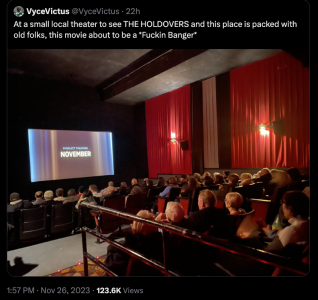May December‘s Charles Melton has won the Gotham Award for Best Supporting Performance. Good, fine and congrats, but may I ask where this Melton energy came from? Why did this happen? What voting bloc rammed this through? What is this?
It is Hollywood Elsewhere’s opinion, due respect, that no less than eight Gotham nominees in this category delivered far more arresting performances than Melton.
HE’s best-of-the-best is The Holdovers‘ Da’Vine Joy Randolph, closely followed by BlackBerry‘s Glenn Howerton. HE’s #3, #4 and #5 picks are Ferrari‘s Penélope Cruz, The Taste of Things‘ Juliette Binoche and All Of Us Strangers‘ Claire Foy.
Then comes Jamie Foxx in The Burial (#6), Rachel McAdams in Are You There God? It’s Me, Margaret (#7) and Ryan Gosling in Barbie (#8).
Then and only then comes the ninth–place Melton.
This is so sweet… charles melton you are so loved pic.twitter.com/SJCJfyPWaf
— e (@mellarkanti) November 28, 2023
The Outstanding Lead Performance award went to Lily Gladstone in The Unknown Country, a film that no one relatively few have seen or reviewed, to go by general impressions. The urge to socially and culturally celebrate Gladstone’s Killers of the Flower Moon Oscar campaign was the motivating factor here. Congrats to her handlers.
The Best Feature award went to Past Lives…yeesh. The Gotham voters really and truly live on their own tight little island.




